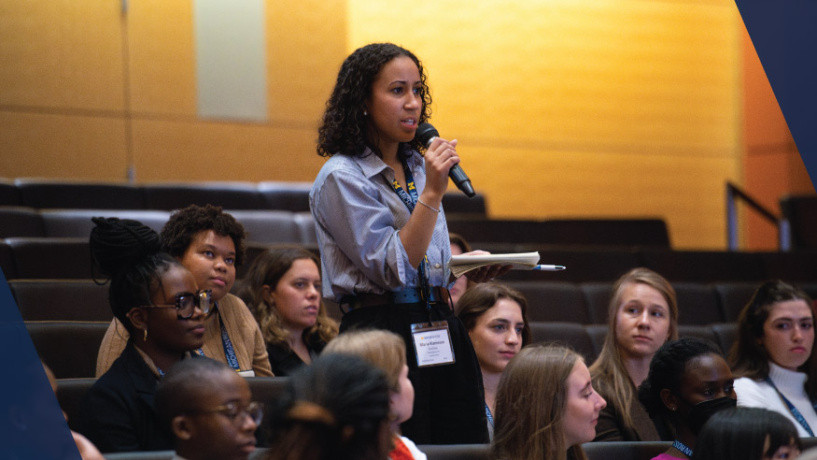Ross Featured In the News - Week of March 22

Week Ending March 22
March 21 - ABC News - Meet your new virtual assistant: The AI in your car (Erik Gordon)
Erik Gordon, a business professor at the University of Michigan, questioned why automakers are fixated on AI driving systems.
"Car companies are trying to differentiate themselves not on styling, not on reliability, but on features that sometimes seem more like gadgets," he told ABC News. "Automakers think consumers are enamored with this technology. They will need to find a way to add these driver-assistance features in way that doesn't feel like we're giving up control."
He argued there may be "tremendous backlash" against the idea that vehicles can act like a human passenger.
"A lot of people don't want their car or any machine to know that much about them," Gordon said. "I predict 9 out of 10 consumers will turn it off."
March 21 - Reuters - CapOne tells regulators Discover deal will boost competition and stability (Jeremy Kress)
AELP is an antimonopoly group and opposes the merger. Its founder Sarah Miller last year became chief of staff at the Federal Trade Commission, another competition watchdog.
"This analysis from AELP is a great window into how people like Jonathan Kanter and other Biden administration officials might be approaching this deal," said Jeremy Kress, a University of Michigan professor, referring to the Justice Department's top antitrust attorney.
March 20 - Financial Times Specialist - Say What?! P&C Industry Jargon Can Confuse a Carrier's Message (Sarah Zimmerman)
Managers need to be especially sensitive to newer workers who may not be familiar with or understand what certain terms mean. "If you're trying to lead a team of young people who don't know these terms, it's much better from a leadership perspective to speak plainly," said Sarah Zimmerman, a business lecturer at University of Michigan's Stephen M. Ross School of Business.
"When people are trying to speak with colloquialisms, jargon, or acronyms, it doesn't help us understand the message itself. It doesn't impress people if they don't understand you," Zimmerman added.
March 20 - WILX Lansing - National Association of Realtors lawsuit sparks change of commission fees (Brian Connolly)
In hopes of a potentially larger payout, University of Michigan Business Law Professor Brian Connolly says the 6% pushed brokers to sell more expensive homes.
“The buyer broker would get half of the commission and the expectation is that that will probably go away and buyers will now have maybe a number of ways to pay a broker in connection with a real estate purchase,” said Connolly.
March 19 - BBC News - Trump Needs a $464m Bond in Six Days. What if He Can’t Get It? (Will Thomas)
"We really are in a moment of serious crisis for Trump personally, as well as for his business," said Professor Will Thomas from the University of Michigan Ross Business School.
The fact that Mr Trump has assets in the state of New York that can be seized, however, could reassure a court that he would be able to pay the penalty if he lost the appeal, according to Mr Thomas.
March 18 - Bloomberg - Women are Closing the B-School Dean Gap (Sharon Matusik)
Women still lag men considerably when it comes to deanships. The vast majority of women who are deans now have spent most of their careers underrepresented as faculty members and in leadership positions, says Sharon Matusik, dean of the University of Michigan’s Ross School of Business.
One reason for the scarcity is that women have had more difficulty gaining tenure and full professorships at B-schools, which are often prerequisites for the top job, Matusik says. Women make up 40.3% of tenure-track faculty at business schools globally, “but that’s where the progression stalls,” according to a 2022-23 AACSB survey. Only 25.7% are full professors, the survey found.
Week Ending Mar. 15
March 10 - KCBS San Franciso Radio - The March Numbers are in from the Financial Times-Michigan Ross Poll (Erik Gordon)
Erik Gordon joined Dan Mitchinson of KCBS San Franciso on March 10th to discuss the results of the March Financial Times-Michigan Ross poll. Gordon and Mitchinson discussed what the numbers tell us about voters’ feelings toward the economy and issues surrounding it, and what issues will top the list of priorities for voters as we continue moving toward the November election.
When asked how voters are feeling about the economy, Gordon said, “They're not feeling great about it. Only about 20% of them say that they're better off since Mr. Biden became president, versus 48% saying they're worse off. And amongst independent voters, those are the voters who might swing the election, the number is even gloomier. 62% say they're worse off.”
March 9 - KCBS San Franciso Radio - Ideas to Ease the Housing Crisis in the United States (Brian Connolly)
Brian Connolly joined Dan Mitchinson of KCBS San Francisco on March 9th to discuss the housing crisis plaguing cities across the country. Connolly and Mitchinson discussed the challenges that lawmakers face when creating more housing and his own ideas on how to help ease the housing crisis.
“At the federal level, there are a lot of challenges. Our federal government doesn't build housing, it participates in funding for some housing and provides tax credits for affordable housing. But housing is certainly a major issue around the country. And so some of the challenges that the federal government faces is we have high-interest rates that are making new development of housing challenging in the current market, we're still seeing elevated construction costs, you know, still, some supply chain issues stemming from the COVID pandemic, but also labor shortages in the construction market. And then also, and this sort of goes to some of what was discussed at the housing ideas showcase, there's relatively little land available in many of our major metropolitan areas for new housing development. And that's due in significant part to local zoning restrictions, but also other other laws as well that are passed by state and local governments.”
Week Ending Mar. 8
March 3 - KCBS San Franciso Radio - The Endless Backlog of Cases Before the Supreme Court this Term (Will Thomas)
Will Thomas and Dan Mitchinson discussed how the court balances a large number of cases and how the Trump presidential immunity appeal and a looming presidential election have impacted the way the court prioritizes some cases before others.
“I suspect that to the extent the court has to sort of prioritize, they will be emphasizing cases that you have a deadline of the November election. So those are cases like the Trump election cases, some of the January 6 cases. There's also a variety of other kinds of, like legislative map or congressional map cases that the court wants to get to sooner rather than later. Some of the other cases, things like Second Amendment issues, some like medical access or religious exemptions, they're very important cases, but there's not that same sort of ticking clock. So to the extent the court wants to put its attention, it will do the things with the deadline first.”
Week Ending Mar. 1
March 1 - Politico - If One Megabank Collapses, the US Economy Goes With It. Should We Have More? (Jeremy Kress)
“If you are concerned that the really big banks are too powerful, and they’re not facing enough competition, and that they pose a financial stability risk, the idea is not to create more really big banks,” said Jeremy Kress, who last year served as an adviser to the Justice Department’s top antitrust official, Jonathan Kanter.
Feb. 28 - The Wall Street Journal - You Think You’re Doing Fine in Life, Until You Hear a Friend Is Doing Better (Scott Rick)
Social media sometimes gives people the false impression that your sphere of influence is larger and more diverse than it actually is, said Scott Rick, associate professor of marketing at the University of Michigan. In all likelihood, he said, people overestimate the different perspectives they’re exposed to and instead rely on the same set of influences to gauge whether or not they’re successful.
“There’s no objective answer to ‘Am I doing well? Or not?’” he said. “On social media, it’s still ‘birds of a feather flock together’ in who we follow and who the algorithm presents to us. It’s very much enforcing our worldview.”
Feb. 24 - KCBS San Francisco Radio - The Economic Concerns that Could Emerge in a Post-Roe World (Sarah Miller)
"...now we have 21 states where abortion is either banned or severely curtailed," said Miller. "And as you mentioned, we're starting to see those have implications in places like Alabama for things like IVF, where maybe people didn't quite expect there would be such repercussions."
"You've seen a lot of companies say that they will pay for their employees to go out of state to get access to reproductive reproductive health care. You have big companies like Salesforce, and a few other smaller companies as well being willing actually to move their employees out of state. And I think it's also affecting on the hiring side. If you're trying to attract someone to come into your state and take a job, I think there are going to be implications there as well. The labor market is really tight right now. So it's really hard to hire. And this is definitely not helping. We've had Austin (Texas) based companies like Bumble say that they've seen as much as a third of their workforce say that they want to go remote, live in a different state outside of Texas because of these new restrictions."








